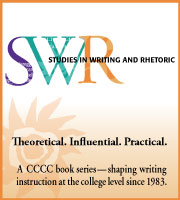The Conference on College Composition and Communication (CCCC) Executive Committee follows the principles of knowledge-based governance, a decision-making model that encourages careful study of relevant information and full dialogue and deliberation about the consequences of action before policy is established. When contemplating an issue, we ask:
- What do we know about how this issue may effect our members and stakeholders?
- What do we know about how trends–educational, demographic, economic, or cultural–are changing this issue?
- What do we know about NCTE’s capacity to act, alone or in alliance with others, on this issue?
- What are the ethical dimensions of our choices?
The following are motions passed by the CCCC EC around their yearly strategic issues:
2012 Vision Statement
12.E.06 MOTION (Anson/Pough) CARRIED: That we approve the vision statement in principle with the understanding that further revision will take place, attentive to the further discussion at the March EC meeting, leading to a final draft to be put to an Executive Committee vote by the end of our November meeting.
By 2022, CCCC will be a clear, trusted public voice for the teaching and learning of writing, rhetoric, and literacy in all higher education contexts. We will have fostered, in academic and in informal learning settings, the conditions in which students, the general public, and teachers engage in civil deliberative discourse about what it means to be literate. We will support the delivery of quality literacy instruction through sustainable, relevant, and ethical models of teaching and learning.
In order to support this, CCCC will be an organization that values members who represent a diversity of races, cultures, languages, identities, institutions, and institutional roles, and will create multiple access points for participation among our various constituents. We will work at the leading edge of shifting notions and new definitions of writing, rhetoric, and literacy through valuing and creating space for a wide and vibrant range of scholarship.
In all circumstances, we will advocate for language use as a fundamental human activity that empowers individuals and communities.
2012: Leadership Group
12E.09 MOTION (Selfe/Rodrigo) CARRIED: That CCCC create more opportunities for SIGs and caucuses to meet at times throughout the Annual Conference.
12E.10 MOTION (Selfe/Journet) CARRIED: That CCCC create opportunities for more interactive sessions available throughout the Conference.
12E.11 MOTION (Selfe/Moore) CARRIED: That the EC leadership group, in collaboration with Committee on the Status of Graduate Students and the Graduate Student SIG, develop a nomination and election process that will add (a) graduate student(s) to the EC.
12E.12 MOTION (Selfe/ Rodrigo): CARRIED: To advise the Chair to form EC form an Engagement Committee to work in conjunction with the Newcomers committee to engage and retain experienced CCCC attendees and emerging leaders.
2010: Dual-Credit/Concurrent-Enrollment Focus Group
10E.24 MOTION (from the committee) CARRIED: To establish a task force to develop a position statement outlining best practices, policies, and procedures for instituting dual-credit/concurrent-enrollment programs.
2009: Research
09E.20 MOTION (Fleckenstein/Glenn) CARRIED without dissent: That CCCC develop a multi-year research program/agenda that addresses key concerns voiced by the membership.
09E.21 MOTION (Strasma/Young) CARRIED: That CCCC should develop a research advocacy committee to coordinate CCCC research interests with other national policy-making organizations and articulate research opportunities to membership.
2008: Building a More Diverse CCCC
08E.16 MOTION (Fitzgerald) CARRIED: That CCCC design a means of assessing the 2009 piloted diverse presentation formats and continue to pilot and assess other formats in 2010.
2008: Technology, Globalization/Interconnections, and Changes in Student Populations
08E.17 MOTION #1 on Technology was withdrawn and will be referred to the Committee on Research.
08E.18 MOTION #2 (Fleckenstein) CARRIED: To prepare the membership for the growing challenges and opportunities posed by globalization, we move that the CCCC Chair establish a task force to explore issues related to the nature, scope, and implementation of globalization/internationalization for the writing classroom and postsecondary education. This process may culminate in a policy statement that articulates potential local and organizational responses to globalization. If created, the policy statement may be published on the NCTE Web site and disseminated throughout the membership by November 2009.
08E.19 MOTION #3 (Fleckenstein) CARRIED: Because the majority of postsecondary composition teachers lack formal preparation in addressing the challenges posed by the increasing diversity of students, particularly multilingual writers, we move that CCCC advocate for changes in writing teacher preparation, culminating in a set of guidelines for teacher preparation. Furthermore, by March 2010, CCCC will widely distribute those guidelines to school administrators’ organizations, accrediting agencies, national media, and K-postsecondary teacher organizations. Finally, CCCC will collect annual data from the membership through NCTE survey initiatives to ascertain the formal preparation of writing teachers to address the diverse needs of their multilingual students, beginning in 2011 and continuing through 2017.
2008: Connecting with Literacy, Composition, and/or Rhetoric Educators in Nontraditional Settings
08E.21 MOTION (Anokye/Day) CARRIED: That the Chair of CCCC appoint a committee to create a position statement that validates literacy work by academics in non-academic settings and to present the statement at the Executive Committee meeting in March 2009.
08E.22 MOTION (Calhoon-Dillahunt/Devitt) CARRIED: That CCCC support the work of non-traditional literacy educators by publishing the Position Statement in its journals and on the NCTE website and plan a session on this topic for CCCC Convention March 2010.
The motion above was originally tabled and revisited later in the meeting.
08E.23 MOTION (Anokye/Day): CARRIED: Because the intellectual and professional contributions of college writing teachers who are publicly engaged in nontraditional writing settings are not always considered in the evaluation process for tenure, promotion, or merit, we move that the chair of CCCC appoint a committee to create a position statement that validates as intellectual contributions to literacy by college writing teachers in nonacademic settings, and to present the statement at the EC meeting in November 2009.
2007: Membership Study
07E.30 MOTION (Moneyhun for Membership Focus Committee) CARRIED. By March 2009, CCCCs will know the reasons that cohorts (for example, by age, gender, minority status, job status, institutional type, career stage) give for not joining or renewing and for not attending the convention.
07E.31 MOTION (Powell/Young) CARRIED (divided vote): To amend the motion to insert “and institutional and individual participation in community outreach and/or service learning” after paren following “administrative.”
07E.32 MOTION (Moneyhun for Membership Focus Committee) CARRIED AS AMENDED. By November 2010, CCCC will have easily upgradeable databases about the profession in general and about our membership. The faculty/administrative databases should include at least age, gender, race, institutional type, career stage, salary, degrees, classes taught, graduate school specialization (comp/rhet or lit), job status (full-time tenure track or tenured, full-time non-tenure track, adjunct or part-time, full-time administrative, part-time administrative) and institutional and individual participation in community outreach and/or service learning. Institutional information should include class size in writing courses for undergraduate and graduate programs.
2007: Allies and Public Policy
07E.33 MOTION (Roen for Focus Committee) CARRIED on a divided vote: We move that CCCC develop mechanisms for communicating with allies (such as TYCA, WPA, NWP, IWCA, NCTE, NCA, AAAL, AERA, NABE, TESOL, AAC&U, MLA, RSA, IRA) who share common concerns. This should be done as soon as possible.
07E.34 MOTION (Roen for Focus Allies and Alliances Committee) CARRIED: To position CCCC as an authoritative source for public policy, we move that CCCC review and, where necessary, revise policy statements, guidelines, best practices, and position statements to maximize their clarity, consistency, continuity, currency, and completeness. This review should begin as soon as possible.
2007: Leadership
07E.35 MOTION (Fleckenstein for Leadership Focus Committee) CARRIED: We move that CCCC will develop within the next year a policy statement concerning leadership opportunities and experiences. Such a statement should address the importance of 1) personal and professional networks, 2) consistent and ongoing mentoring, and 3) intellectual, practical, and emotional support during leadership positions.












